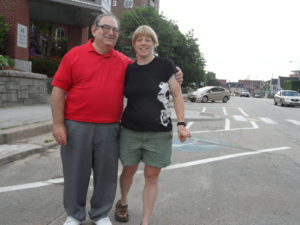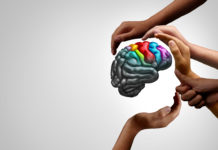For those with lived experience, do people believe your recovery story? What restrictions do people put on you when you tell your story? What one-liners have you found to defuse people’s concerns so that they can hear you? How do you stay in the advocacy game instead of getting frustrated at being the only one who knows the data? This is my story of disclaimers, advocacy friends, respect for religious beliefs, and sustainable advocacy efforts.
Disclaimers and Stuck Advocacy
When I tell my recovery story, I talk about coming off psych drugs. In general I found that freeing myself from psych drugs and psych labels helped me feel a lot better. Having fully informed consent and knowing that I could use psych drugs as a temporary tool instead of a long term solution was important.
Then my disease model advocate friends always ask me to say a disclaimer about, “Well, some people are helped by psych drugs.” And I do say that disclaimer, because it’s true, and because nuance is good. And all people have a right to their own recovery story, and if my story is true so is theirs. And I try to respect my advocacy friends even when they come at it from the opposite angle. My late friend Ken Braiterman said that’s what helped him maintain a sustainable career through 20 years of system change efforts.
He found, and I find, that many people still discredit our advocacy by saying, “Well, you are just anti-medication.” Because people like things to be black and white. The line I have found that works best for this, is, “I am not anti-medication, I am pro fully-informed choice.”
And my disease model advocate friends say, “We are not anti-recovery, we are pro wellness. Can’t you see all the stuff we do to promote wellness? We are saying the same message.”
And I say, “Not really, not if you are promoting wellness along with diseases and drugs that damage wellness.”
And they say, “Well, we try to give people fair warning about the risks of drugs.”
And I say, “How can you do that when you don’t really fully understand the extent of the harms being done?”
And then we get stuck on this. “I do understand / no you don’t / yes I do / ” loop. And the discussion stops for a while.
Pro-Drug Recovery Stories

Well, I got in a very bad spot this summer and took some psych drugs. They helped for a while, then I came back off them. I’ve used them a bit intermittently since because there is actually strong evidence for intermittent use, and I find my problems intensify as I up my vision therapy rehab efforts. (Which are now working – happy day! – I missed writing.)
Telling my story of taking these drugs this summer turned out to be one of the best pieces of advocacy I have done. A lot of my disease model friends responded to that story by saying, “Well, I thought you were anti-medication.”
I had to tell them, “No, I’m not anti-medication, I am pro fully-informed choice. I’ve told you that at least six times already.” But I guess I had to show them. I had to put my money where my mouth was. Or at least put the pills in there.
So my disease model friends have a very, very hard time hearing the nuance I put into my recovery story. I finally realized it is totally a religious belief. And religious beliefs are not amenable to data. In fact, much research shows that dropping data on people’s heads just re-inforces their contrary belief system.
Religious Belief Systems
So some of my good friends are disease model advocates and they are also Jewish. One of these Jewish friends is such a good friend she was willing to interrupt her Rosh Hashannah holiday to help me get to the doctor this summer when I was started to feel in danger. Which is like leaving your family in the middle of Christmas dinner to go help a friend.
So I am a Christian, a totally devout, bible-thumping, evangelical, born-again Christian, but I believe in tolerance. And I believe there is a ton of evidence in the Bible for tolerance. So I don’t agree with my Jewish friend’s religious beliefs. But I do I agree with her right to believe them. And I think they actually might be legitimate ways to view the world. And I don’t really spend time arguing with her on religion. Because no matter how much data I present to her about, “The Messiah is real, he can help you, he has come,” she is not interested.
Just like I am not interested in her data about, “The Messiah has not yet come, Jesus was a prophet like any other, he was not the one.” And there are mounds and mounds of books, studies, articles, ect. on both sides of this. I just con’t care about that stuff. No matter how much she wants to say it, I’m not interested in learning anything about that line of thinking. I have no doubts about my world view, I have done my research, drawn my conclusions, and I am just done with that topic. No curiosity.

So I finally realized I need to respect her belief in the disease model religious system, too. No matter how much I say, “There is no chemical imbalance, the drugs don’t work better than placebo, in the long-term, in the aggregate (notice that important disclaimer?), this is trauma, most of this is about life situations, etc….” She simply doesn’t want to get into it. Any more than I want to hear about Jesus is not the Messiah. She keeps saying she already understands all that, but drugs are important, too.
And we get back into this same loop of Drugs harm people/ We give them warning / How can you warn them if you don’t know the full extent of the harms / We do know / no you don’t / yes we do / ” loop. And the discussion stops again for a while.
But we are still friends. And this is after I hammered at their group for doing a stigma campaign that promoted the disease model. I tried over and over to help them reform it to more updated stuff. We had the same loop: labels and diagnoses harm people / but they help too / but you don’t understand the extent of harms / no you don’t / yes we do.
It got bitter and I told them they were damaging people just like the Holocaust, but they still talk to me amazingly. And the late, great Ken Braiterman’s sister told me that comparing medical harm to the Holocaust was an intellectually dishonest arugument on my part because medical harm is (usually) unintentional.
And so eventually I came to realize that my disease model friends were simply not interested in my data, and eventually I came to respect that. Why?
Because Dropping Data on people’s head is
NOT an evidence-based way to promote social change.
So if data doesn’t work, what does?
- Well, we need to recognize our own rigidity, we all have our decided and confirmed places.
- Keep listening.
- Keep talking.
- Keep being friends with people.
- Be respectful of where they are at.
- Look for common ground
- Work for shared goals
- Focus on program change instead of belief system change
- Focus on tangible advocacy efforts (policy change, program development, provision of alternatives) vs. intangibles (moving beyond the disease model, ending psychiatry, erasing so-called stigma)
It turns out that the solution to many of our problems is the same regardless of the root cause of the problem. My friend Paul Komarek says, “Who care if we have the same creation myth?” And the solutions in the mental health industry are stuff like wellness, peer support, prevention, trauma-informed care, heavy social supports during crisis, etc. And if we are working for the same solutions, does it matter if we totally agree about the extent of medical harm?
How do I work at this intersection of love and outrage? It’s not easy. I get mad every time someone is paid big fat money in the mental health industry and they don’t even know the academic literature in their own field. I’m in a feud as we speak with a community coalition in our city. They want do workgroups on trauma-informed care, but not include peer advocates, and expect coalition members to do all the work unpaid. It pisses me off that directors of that group will pay themselves big fat salaries and expect advocates to work for free.
But I am not using ad hominem arguments, I am just dropping a tiny bit of data on their laps, not too much. I am trying to voice my concerns along with positive, concrete suggestions for action. And I’m ready to walk away if they can’t hear me. And come back later.
There is always later if you are working at a sustainable pace. And treating advocacy opponents like people is what makes it sustainable.
So maybe next time my disease model friend who tells their recovery story, she will tell her disclaimer. Maybe after I have been to her potlucks and she has donated to my crowdfunding campaign. And I have helped people apply for her grant and she has invited me to the Community Seder at her synagogue. Maybe after all that, maybe we can hear each other. And I will keep adding disclaimers to my work, and maybe she will start adding disclaimers and nuance to her work.
Maybe, after all this pans out, my disease model friends can say,
“I got better using psych drugs,
but a lot of people don’t, they might get harmed by psych meds.
And they have to find other things that help instead.
And that is OK, too.”
That is all I am really asking. Can people just start adding that disclaimer? Can we start making systems that add that disclaimer? Because it’s true. And because nuance is good.
And Maybe after all, I will be able to hear that this is actually what my friend has been saying all along. Maybe this is already her message, and she has already said it six times. And maybe this entire problem is on me. Because I like things black and white. And she has been saying it the whole time.















Dear Corinna:
I’m thrilled to hear that your eye therapy is working and that you can write again! Yah! I so look forward to your writing (please post your poetry too)
This post was so upbeat and pragmatic, it made my day. I can be pig headed and stubborn too in my own activism and your checklist of guidelines is actually very useful for preventing burn out!
Often, my rigid views are the result of my love one’s harm in the mental health system and my anger over how few professional allies within the system are willing to go out on a limb for people like my daughter who are receiving involuntary treatment. Of the few allies (providers who don’t necessarily believe in the disease model) who may be willing to go out on a limb, their treatment fees can be prohibitively high and our insurance won’t cover their fees or they don’t want to play interference or vocalize their concerns if it would jeopardize their livelihood.
Report comment
I don’t tell most people anything because I treated myself by accident. I will tell you, but you probably think I’m severely deluded; the Drugs ‘r Us friends will think I should be medicated into the Twilight Zone and left there.
Here’s the tale: around 40 years ago I left a job in a fury, but decided I’d go back if I couldn’t find something interesting to do. I became intrigued by the thought of collecting hallucinogenic mushrooms from the Great Lakes region, where I live. I also studied the original Vitamin B3 therapy in case I got too strange for my own good and used it daily in a few instances when I did. I also found I didn’t have hay fever when that season came about and therefore continued to take several grams of B3 and C (taken earlier to prevent colds during a winter of working outdoors). After several months of this, I stopped and began to fall into a despair I felt was my real personality- even views of an ordinary street took on a sinister turn- until I realized this has come on in a few days. I piled on the B3 and that’s the story, except for giving up junk food, alcohol, tobacco and caffeine and getting into orthomolecular medicine. Now I live like a spy, though I do find being able to comment on some of these articles helps me organize my thoughts.
Report comment
I won’t tell anyone. Mum’s the word.
Report comment
Beautifully expressed, as usual, Corinna. Yeah, dropping data on people’s heads is a huge turn-off, in the same vein, to me, as neurobabble. The best way to make social change is the soft approach, which you outline. Respect, common ground, tangible advocacy goals. May I add another approach? Telling our stories. MIA’s great in this regard.
Report comment
Corinna
I tried to come off maintenance doses of medication many years ago and ended up in hospital fairly quickly.
When I was in hospital I got chatting to a clinical psychologist who reassured me that every single patient in the hospital could recover through non drug means. This was how things turned out for me once I identified withdrawal syndrome.
The Psychologist was a very softly spoken humane man and he was popular with everyone.
Unfortunately many years later most of the patients I knew, are now dead (while most of the staff are still alive and well).
Report comment
I agree, standing firm and with certainty in our own beliefs–regardless of those of others and what the world may try to impose on us–is our integrity. I believe that’s why psychiatry is such a problem: they impose their belief and perspective on others, despite the fact that judgment, discrimination, duality, and stigma that is inherent in these beliefs and practices. Going by what works for us, which is personal to everyone, is the best example of personal freedom, which, to me, is exemplary activism.
Report comment
I agree that sledgehammers aren’t the most popular tools of change. Although some people are very skilled at swinging sledgehammers to affect change, they are tiny in number, and if you look closely, the sledgehammer is smuggled in inside a Trojan Horse.
People addicted to drugs always, always rally together when they want to get off them, but moreso when they want to keep using the drugs and normalising the behaviour. Hence why bars and nightclubs are so popular.
But people on mind-changing psychiatric drugs are, to borrow from Dr Breggin, “spellbound.” They are consequently an unreliable witness. This is why I cannot and will not take “drug-induced” recovery stories seriously.
There isn’t a middle way. If people put you under pressure to say something nice about their drug addiction, say nothing, or, tell the truth, as you see it.
Perhaps the more realistic approach is for everyone to accept that they use some kind of psychoactive drug to help get them through the day.
Unfortunately it is impossible to be “fully informed” about psychiatric drug use. There remains too much unknown. What we do know is that they permanently damage the brain and that somehow that brain damage can, for some, bring about a change in personality which the changed personality considers beneficial. Of course, in the absence of being able to manifest the pre-brain damaged personality to give their opinion on the change, it’s really just the middle class politeness criterion that is left, refusing to say the obvious because it wouldn’t be “nice”.
Report comment
The hospital shrinks of the 1950’s were slow to catch on to the complications of pharmacotherapy because they were so amazed there was no more bedlam in Bedlam, they presumed something therapeutic was happening.
Report comment
When you deprogram people, you force them to think…But I keep them off balance and this forces them to begin questioning, to open their minds. When the mind gets to a certain point, they can see through all the lies that they’ve been programmed to believe. They realize that they’ve been duped and they come out of it. Their minds start working again….
That is a quote from the Wikipedia page on deprogramming. It was edited out but its easy to look at old pages on the web archive.
http://web.archive.org/web/*/https://en.wikipedia.org/wiki/Deprogramming
Get them to begin questioning: A chemical imbalance ? Can I see your lab tests ? Do you know anyone who has received a chemical test ?
Five stages of deprogramming
1. Discredit the figure of authority: Psychiatry the medical model ect
2. Present contradictions (ideology versus reality): “How can they call it help when they abuse people and deny informed consent ? Why if the drugs are supposed to make people feel better do they need force and coercion to get people to take them ? Why with all these new treatment of the last 50 or so years does the number of chronically ill people keep going up instead of down ?
3. The breaking point: When a person begins to listen to the advocate; when reality begins to take precedence over the multi billion dollar psychiatric and pharmaceutical marketing machine.
4. Self-expression: When the person begins to open up and voice gripes against psychiatry.
5. Identification and transference: when the subject begins to identify with the human rights in psychiatry advocate and starts to think of him- or herself as an opponent of psychiatry rather than a member of it.
Report comment
I put a link to Corinna’s article as a topic here http://www.psychforums.com/anti-psych/topic176033.html if anyone wants to join in or view the thread.
I improved my above comment a little, MIA needs a coment edit button !
Report comment
Corinna, sounds like your approach works well for you, but I don’t think that disclaimers are a must in every situation. I agree diplomacy is important, but if I’m telling about my experience with something, don’t think it would discredit anyone else. I also find that this problem could use more than one approach, including ones that are only critical, because not only is psychiatry regarded as experts, but also given authority. People who have been harmed greatly also may not feel like there is any positive side. The reverse is true who feel it it essential to them, but at the end of the day people need to be told to do what they believe is right. However giving another side can be good, even though not everyone may acknowledge both of them. Nuance can also be archived by people as whole. Although I do agree that systems, set in place should try try and have many perspectives within them.
Report comment
If someone has been harmed, or someone they care about they may not be inclined to add a disclaimer. I don’t like psychiatry either, but if someone is already insecure, or feeling that it’s the only hope, giving them access to other information is good, then that may be all they can focus on. however, a big concern is if everyone, advocating against psychiatry gives disclaimers, it could be an excuse for forced medicine. I know you are against it, but, I feel ending it will require a lot more biased towards the harm it causes.
Report comment